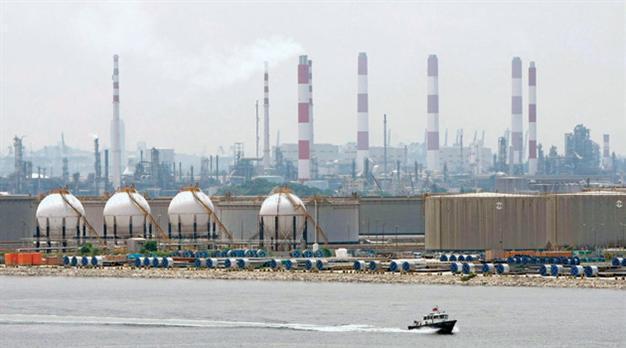Minister hits at Turkish Central Bank
ISTANBUL - Hürriyet Daily News

A boat passes in front of an oil refinery located on Singapore’s Jurong Island in this file photo. Economy Minister Çağlayan has paid a visit to the island over the weekend as Turkey plans to establish a similar facility. REUTERS photo
Central Bank Governor Erdem Başçı has faced the most serious and direct criticism of his interest rate since he was assigned to the post in April 2011, following last week’s cautious decision to keep the rates on hold.Economy Minister Zafer Çağlayan had openly declared his expectation that the Central Bank would trim the upper end of the interest rate corridor before the rate decision was announced last Thursday.
But the Central Bank disappointed Çağlayan by keeping both the main policy rate and the one-week repo rate at 5.75 percent, as well as the interest rate corridor, which includes the borrowing rate at 5 percent and the overnight lending rate at 11.5 percent. Başçı, ex-classmate and former advisor of Deputy Prime Minister Ali Babacan, introduced the interest rate corridor, a flexible policy to support the currency and control inflation by varying daily rates, now between 5 percent and 11.5 percent.
“I did not place an order regarding the interest rate reduction,” Çağlayan said in a witty reply to a reporter’s question about the issue during his official visit to Japan on July 21.
Noting that the Turkish economy had to cross over to a stable take-off from a soft landing, Çağlayan said he supported a number of Central Bank policies, which is not as “timid” as it used to be.
“However, the Central Bank is over-cautious [in its policies]. The bank’s behavior is very important in terms of the management of future expectations. The bank should manage the process much better and give significant messages to the public about expectations. The bank should make its predictions and calculations very well. From now on, the Central Bank has to clearly put forward its action to bring down interest rates,” he said.
Noting that the current account deficit was below the target in the Medium Term Program and that exports in 2012 were set to hit $150 billion, Çağlayan said the Central Bank Monetary Policy Committee should have a clear view of these developments.
The Central Bank’s cautious stance was due to possible increase in the third quarter due to base and seasonal effects, he said. “There will be positive developments in the fourth quarter and the inflation rate will even fall below the third-quarter expectations. That’s why there is no need for the Central Bank to act in such a cautious fashion,” he said.
Visit to Singapore
Meanwhile, Çağlayan said he had met the senior executives of five Japanese companies, with a combined turnover of $87 billion, employing 210,000 people across the world. Among them, The Japanese Steel works showed strong interest in taking part in Turkey’s nuclear power development, he said.
After Japan, Çağlayan moved on to Singapore, where he visited the Port of Singapore. The second busiest port is being taken as a model for the development of the Port of Mersin, located on Turkey’s Mediterranean coast. The Jurong Island, where the largest petro-chemical companies have investments, was the second stop on Çağlayan’s itinerary. Jurong Island has the third largest refinery complex in the world. The government plans to establish a similar chemical industry cluster in Turkey.
Libya set to pay Turkish firms
Libya’s prime minister has ordered progress payments to be paid to Turkish contractors in Libya, as result of the efforts of the Turkish Economy Ministry, Economy Minister Zafer Çağlayan has said.
“The Libyan authorities have decided to pave the way for Turkish contracting firms to return to their incomplete projects, overseen by the Organization for Development of Administrative Centers (ODAC). ODAC, which is the largest employer in Libya, has been ordered by the Libyan Prime Ministry to allow Turkish firms to start working again by paying a 50-percent progress payment,” Çağlayan said yetserday in a written statement.
ODAC will sign agreements for each of the Turkish firms affected, and losses incurred during the transition period will be dealt with by a separate commission, Çağlayan said. “In short the ODAC officials are saying that Turkish firms will receive the same treatment as Libyan firms,” Çağlayan said. Libya was the biggest contruction market for Turkish contractors during the reign of former Libyan leader Gadhafi.
















